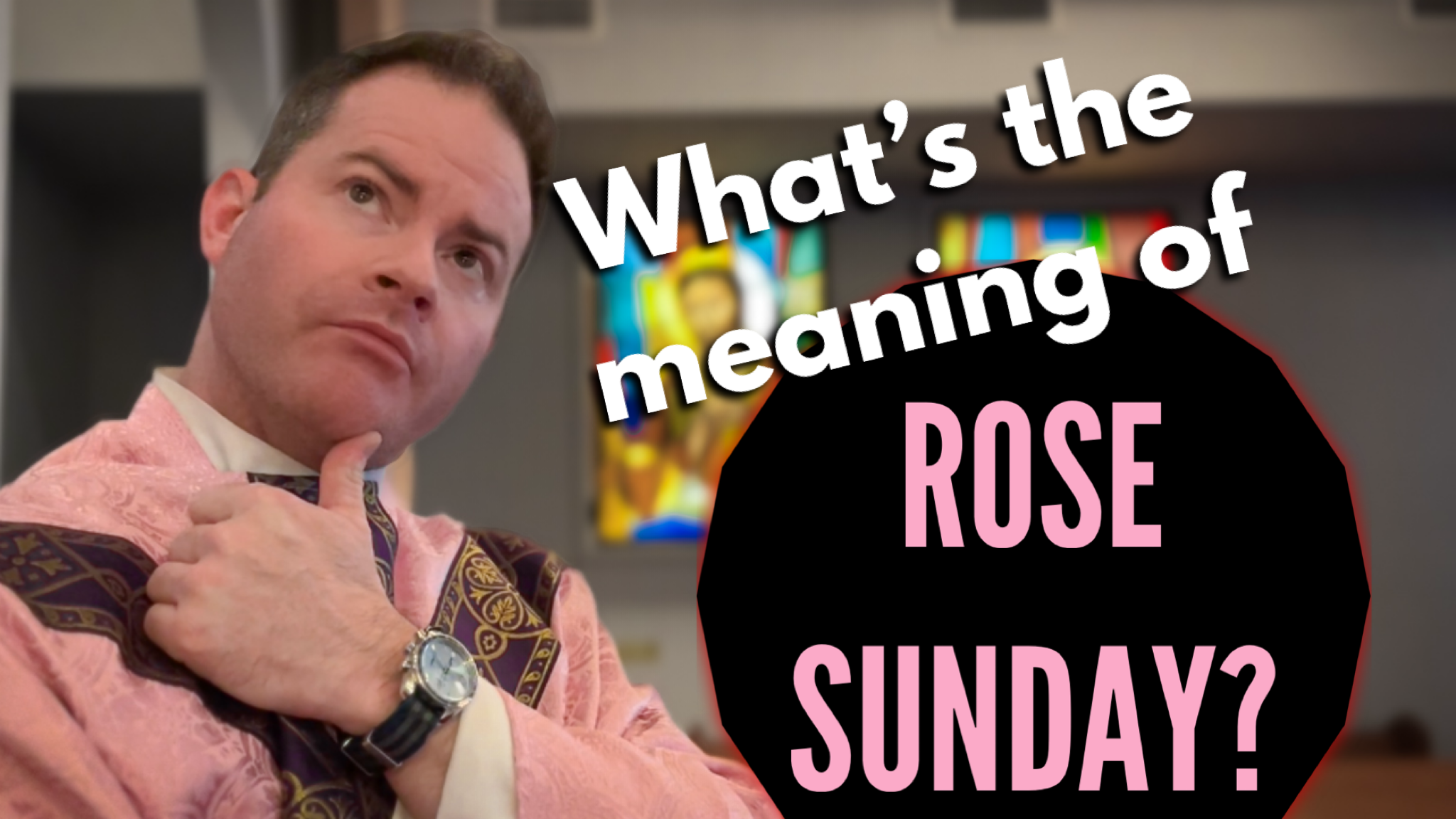Rose Sunday: A Tradition of Commitment and Stability

Rose Sunday, also known as Laetare Sunday, is a tradition celebrated in the Christian faith on the fourth Sunday of Lent (there’s also a Rose Sunday in Advent, but that’s another article for another time). Rose Sunday falls right in the middle of the season of reflection, penance, and preparation for Easter. While it may not be as well-known as other religious holidays, Rose Sunday holds significant meaning for those who observe it.
Fun Fact: Rose Sunday is unique in many ways, including the distinctive Rose (or pink) vestments worn by the clergy during the Eucharist celebration. This liturgical practice is met with mixed feelings among some priests and bishops—some cherish it, others overlook it, and a few outright reject it because “real men don’t wear pink.” (If that’s true, I guess I’m out of luck.)
The Origins of Rose Sunday
The origin of Rose Sunday can be traced “officially” back to the Middle Ages (although it is assumed it was part of church tradition before then). During that time, Lent was observed as a period of strict fasting and abstinence. This meant the people could not enjoy any entertainment or celebration during this time. As a result, Pope Innocent III introduced the concept of “Laetare Sunday” in 1215, which translates to “Rejoice Sunday.” This was meant to provide a break from the somberness of Lent and allow people to celebrate and rejoice in their faith in Jesus and in their many blessings.

As a side note… One of the coolest customs for Rose Sunday goes to Bavaria. In some parts of the region, children parade through their streets with sticks adorned with violets, eggshells, and pretzels. It’s a symbolic funeral parade celebrating the “death of winter.” In some villages, boys are divided into two teams on Laetare Sunday – Team Winter and Team Summer – and they engage in an epic mock battle to decide whether spring is on its way.
By the way…This is a much cooler way to determine if winter is over than relying on a rodent that lives in a hole in the ground… just sayin’.
The Significance of the Rose
The rose has been a significant symbol within Christianity for many centuries. It has been widely associated with the Virgin Mary and has come to represent her purity and her willingness to be the Christ-carrier. The colors of the rose, particularly the pink and red hues, are often seen as a representation of mercy, love, and joy, which are some of the most Gospel-centric values in the Christian faith. The rose has also been used in Christian art and literature as a symbol of the love of Christ and his sacrifice for humanity. Its beauty and fragrance have been used to signify the glory of God’s creation and to inspire feelings of reverence and awe. On Rose Sunday, priests wear rose-colored vestments instead of the traditional Lenten purple, signifying a shift towards the joyful anticipation of the coming Easter celebration.
The Tradition of Commitment and Stability
Aside from its symbolic meaning, Rose Sunday also serves as a reminder of the commitment and spiritual stability required for personal growth. It falls at a crucial halfway point, reminding Christians to reflect on their journey thus far and stay steadfast in their faith for the remaining weeks leading up to Easter. It is a time to renew one’s resolve, strengthen one’s commitments, and continue on the path of spiritual growth enlightened by Christ’s resurrection.
Celebrating Rose Sunday

While the observance of Lent has changed over time, Rose Sunday remains an important tradition in many Christian denominations, primarily the Roman church, some Lutheran churches, and the Anglican Communion. It is often marked by special liturgical services, hymns, and decorations featuring roses. In some churches, rose bushes are blessed and distributed to parishioners as a reminder to stay faithful and continue the journey toward Easter.
Celebration as a Sacred Part of the Lenten Journey.
Rose Sunday serves as a road stop on the Lenten journey, illuminating the path toward the spiritual awakening and renewal of Easter. Just as the customary Lenten disciplines of penance and fasting are necessary on the road to Easter, so is the proverbial pause button during the Lenten austerity to anticipate the resurrection and the profound joy found in the Christian journey.
This theme encourages us to reflect on the beauty of divine love and the inner transformation that comes from aligning one’s life with God’s will. It reinforces the core tenets of mercy, joy, love, and compassion, which are the foundation of our spiritual existence.
As we continue our journey toward spiritual growth, it is essential to remember that faith and action go hand in hand. While understanding theology and church teachings is crucial, it is equally important to put those teachings into practice through acts of love, mercy, and kindness to others. By living out our faith in tangible ways, we can experience the true joy and fulfillment that comes from being children of God.
Rose Sunday Psychology: A Holy Critique of the American Productivity Myth
In the hustle and bustle of modern American life, the cultural ethos largely celebrates ceaseless productivity and forward momentum, often to the detriment of reflective and celebratory pauses. This relentless pursuit of achievement and efficiency risks overshadowing the psychological necessity of restorative breaks, where individuals can reflect, rejoice, and reconnect with deeper values beyond the workplace. With its emphasis on work ethic and productivity metrics, American culture sometimes misinterprets pausing to rest, reflect, and celebrate as a form of lethargy or distraction from ‘more important’ tasks. This misunderstanding undercuts the intrinsic value of such pauses that are crucial for mental health, creativity, and sustained productivity in the long term.
“Until you make the unconscious conscious, it will direct your life, and you will call it fate.” – Carl Jung.
This profound statement by Jung emphasizes the necessity of introspection and reflection. By consciously engaging in pauses for celebration and reflection, we illuminate parts of our inner world that often go unnoticed, thereby gaining the power to shape our destiny rather than being unconsciously driven and even controlled by it.
The cultural inclination to undervalue celebratory and restful pauses neglects the extensive evidence highlighting their psychological significance. As seen in traditions like Rose Sunday, moments of reflection and celebration provide essential psychological reprieve and renewal, fostering a sense of belonging, happiness, and perspective that is critical for holistic well-being. These pauses allow for introspection that can recalibrate one’s priorities and vantage points, offering renewed clarity for subsequent endeavors. By sidelining these moments under the guise of maintaining productivity, we inadvertently compromise on emotional well-being and miss out on the profound benefits that such reflective breaks can accord individuals and society.
One of the more shocking moments of my ministry—and there have been a few that would leave you speechless—was when a parishioner told me point blank that, “There is no such thing as time off to rest and recharge after Holy Week, that’s just slighting the church financially.” This kind of misalignment calls for a cultural reassessment of the values we prioritize and promote to ourselves and the ones we influence. As humans, we need space to pause, reflect, and celebrate life’s milestones and moments of grace—a person who is rested and recharged by the grace, mercy, and love of God will have an impact on the world. Being an agent of hope is unavailable to those de-energized by negativity, exhaustion, and the epistemic certainty that always accompanies fault finding.
The Power of Rejoicing

The essence of Rose Sunday during Lent reminds us that joy and celebration are intertwined with our spiritual walk. It’s a time to reflect on the profound love and joy that our faith brings, especially as we anticipate Easter’s promise of renewal and resurrection. Rose Sunday is a sacred stop on the Lenten journey, which encourages us to hold onto joy, give mercy freely, and practice gratitude. It urges us to carry these sentiments beyond just one day and infuse our everyday lives with the spirit of this season. May the reminder of Rose Sunday uplift us, filling our hearts with an unshakeable faith and a joy that radiates, touching the lives of others. It’s a call to remember that, even in sacrifice, there’s immense joy to be found in our spiritual journeys.
Related Posts
The Night Love Took A Towel
There’s a sacrament we almost forget. It doesn’t shimmer with stained glass or…
April 16, 2025The Broken and the Beautiful: A Les Paul’s Lessons on Scars, Redemption, and Tone
A photograph is an odd thing. It captures a sliver of time, reducing the vastness…
February 1, 2025


Carol Romine | 15th Mar 24
Thank you for this beautifully written explanation of this pause in Lent.
How refreshing to b e reminded that we must not always be doing.